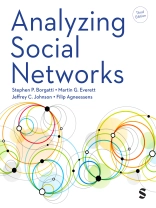Kickstart your research with this practical, bestselling guide to doing social network analysis. Get to grips with the mathematical foundations and learn how to use software tools such as Ne TDraw and UCINET to reach your research goals.
Supporting you step-by-step through the entire research process, from design and data collection to coding, visualisation, and analysis, the book also offers:
• Case studies and examples using real data
• Exercises drawn from the authors’ decades of teaching experience
• Online access to datasets, worked examples and a software manual to help you practice your skills.
Whether you are new to social network analysis or an experienced researcher, this approachable book is your technical toolbox and research companion all in one.
Daftar Isi
CHAPTER 1: INTRODUCTION
CHAPTER 2: MATHEMATICAL FOUNDATIONS
CHAPTER 3: RESEARCH DESIGN
CHAPTER 4: DATA COLLECTION
CHAPTER 5: DATA MANAGEMENT
CHAPTER 6: MULTIVARIATE TECHNIQUES USED IN NETWORK ANALYSIS
CHAPTER 7: VISUALIZATION
CHAPTER 8: LOCAL NODE-LEVEL MEASURES
CHAPTER 9: CENTRALITY
CHAPTER 10: GROUP-LEVEL MEASURES
CHAPTER 11: SUBGROUPS AND COMMUNITY DETECTION
CHAPTER 12: EQUIVALENCE
CHAPTER 13: ANALYZING TWO-MODE DATA
CHAPTER 14: INTRODUCTION TO INFERENTIAL STATISTICS FOR COMPLETE NETWORKS
CHAPTER 15: ERGMS AND SAOMS
Tentang Penulis
Filip Agneessens is an Associate Professor at the Department of Sociology and Social Research, University of Trento. He has published on a diversity of topics related to social networks, including measures of centrality, statistical models, ego-networks and social support, two-mode networks, negative ties, multilevel networks and issues related to data collection. He has also applied social network analysis to understand the antecedents and consequences of interactions among employees, and in particular within teams. Together with Martin Everett, he was a guest-editor for a special issue on “Advances in Two-mode Social Network Analysis” in the journal Social Networks, and together with Nick Harrigan and Joe Labianca he guest-edited a special issue on “Negative and Signed Tie Networks”. He has taught numerous introductory and advanced social network courses and workshops over the last 15 years.












